* You are viewing Posts Tagged ‘Communication’
Edited by the Foundations of Modern Thought Research Centre at the University of Bucharest, and featuring our very own Howard Hotson on its Advisory Board, the new publication is billed as a ‘an interdisciplinary, peer-reviewed journal of intellectual history, dedicated to the exploration of the interactions between philosophy, science, and religion in Early Modern Europe’. The epistolary opener features seven contributions (as well as related review essays and book reviews) on particular correspondents and correspondence networks, including an article by Noel Golvers on Sino-European exchanges in the seventeenth and eighteenth centuries; Noel initiated our seminar series in 2010 with a wonderful paper on this topic (listen to the podcast). For full details and to order your copy, visit the journal webpage.
Following on from November’s workshop, a second installment of Across the Channel: Intellectual Relations between England and France in the Early Modern Period will take place at the Maison Française D’Oxford on Tuesday 28 February 2012. Organised by Martine Pécharman and our very own Philip Beeley, this boutique event will allow five invited scholars to explore Anglo-French exchanges from a variety of perspectives in the context of rich case studies. For the full programme, see the workshop webpage; all are welcome.
Cultures of Knowledge hopes to collaborate on and co-produce a third Across the Channel workshop later in 2012. Watch this space!
 The second annual Anglo-French Conference on Scientific Communication and its History will take place in Paris at the Ecole Normale Supérieure on 9–10 March 2012. The conference will explore how technological developments – from the invention of printing with movable type to the postal network, from the railway timetable to the electric telegraph, from the telephone to e-mail – have profoundly influenced the nature of scientific communication and the structure and practice of science. It will bring together scientists, historians, social scientists, and science communicators to explore the role of technologies, both physical and social, in the history and present practice of communication within and around scientific communities and between science and its various publics. The conference will be organised around four themes: print and text; correspondence; networks and gatherings; and non-print media. In each of these it will explore the interaction between technical change and communicative practice by considering examples taken from across a wide range of historical conjunctures and disciplines. Papers should be thirty minutes in length, and should fall within one of the four themes. Doctoral students are invited to give fifteen-minute papers. The deadline for 300-word proposals is 15 January 2012. For further details and submission instructions, please download the conference flyer (pdf).
The second annual Anglo-French Conference on Scientific Communication and its History will take place in Paris at the Ecole Normale Supérieure on 9–10 March 2012. The conference will explore how technological developments – from the invention of printing with movable type to the postal network, from the railway timetable to the electric telegraph, from the telephone to e-mail – have profoundly influenced the nature of scientific communication and the structure and practice of science. It will bring together scientists, historians, social scientists, and science communicators to explore the role of technologies, both physical and social, in the history and present practice of communication within and around scientific communities and between science and its various publics. The conference will be organised around four themes: print and text; correspondence; networks and gatherings; and non-print media. In each of these it will explore the interaction between technical change and communicative practice by considering examples taken from across a wide range of historical conjunctures and disciplines. Papers should be thirty minutes in length, and should fall within one of the four themes. Doctoral students are invited to give fifteen-minute papers. The deadline for 300-word proposals is 15 January 2012. For further details and submission instructions, please download the conference flyer (pdf).
The newly founded Journal of Early Modern Studies is seeking contributions for a special issue on the timely theme of ‘Shaping the Republic of Letters: Communication, Correspondence and Networks in Early Modern Europe’:
‘A well known metaphor of the early European modernity and an important instrument in the understanding of seventeenth-century thought, the ‘Republic of Letters’ was, in the sixteenth and seventeenth centuries, primarily a label for new projects of intellectual and scientific association. Various models for the Republic of Letters have been investigated and described as closed circles or open networks, shaped around a variety of elements: scientific societies, intellectual networks, formal or informal circles of intellectuals, proponents of the new and old philosophies. What all such models had in common was a an ideal of shaping communities around a moral, intellectual and sometimes a religious project understood as a reformation of the (whole) human being.
This special issue of the Journal of Early Modern Studies aims to bring together articles devoted to the investigation of such models of early modern communities governed by the ideal of the Republic of Letters. The journal is particularly seeking papers dedicated to the exploration of various ways of disseminating and communicating knowledge within the Republic of Letters, with a special focus on the exchanges between the East and the West of Europe…’
For more information please contact Vlad Alexandrescu.
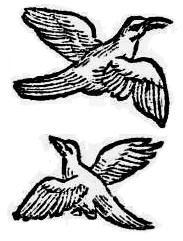 The Early Modern Center of the University of California at Santa Barbara invites paper proposals for their eleventh annual conference, Early Modern Social Networks, 1500-1800. The conference will take place on March 16-17, 2012 at UCSB, and will feature keynote speakers Ann Blair (Harvard University), Elizabeth Eger (King’s College London), and James Raven (University of Essex). Possible topics include: knowledge networks, (such as the Royal society, libraries, salons, and coffeehouses); secret societies; clubs; literary coteries; epistolary correspondents; religious communities (including sacramental practices); print and publication networks; gift communities (patronage, the ward system); trade networks (such as the East India Company, the Royal Exchange, workers’ guilds, black markets); colonial administration; infrastructure expansion (the post, turnpikes, canals); financial organizations (stock markets, insurance); and others. The deadline for abstracts of 250-500 words in length is January 6, 2012. For further details and submission instructions, see the conference website.
The Early Modern Center of the University of California at Santa Barbara invites paper proposals for their eleventh annual conference, Early Modern Social Networks, 1500-1800. The conference will take place on March 16-17, 2012 at UCSB, and will feature keynote speakers Ann Blair (Harvard University), Elizabeth Eger (King’s College London), and James Raven (University of Essex). Possible topics include: knowledge networks, (such as the Royal society, libraries, salons, and coffeehouses); secret societies; clubs; literary coteries; epistolary correspondents; religious communities (including sacramental practices); print and publication networks; gift communities (patronage, the ward system); trade networks (such as the East India Company, the Royal Exchange, workers’ guilds, black markets); colonial administration; infrastructure expansion (the post, turnpikes, canals); financial organizations (stock markets, insurance); and others. The deadline for abstracts of 250-500 words in length is January 6, 2012. For further details and submission instructions, see the conference website.
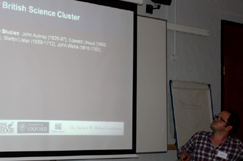
James introduces the Project.
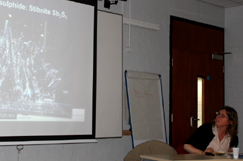
Anna Marie describes stibnite.
The Project was on the road again this week, this time at the venerable Reading Conference in Early Modern Studies, which this year took as its theme ‘Communication and Exchange’ (University of Reading, 18−20 July 2011). On Monday afternoon, a panel devoted to CofK comprised three interlocking papers. Project Coordinator James Brown provided an overview of the Project and its intellectual objectives, Research Fellow Anna Marie Roos delivered a wonderful case study of Martin Lister‘s hitherto unsung contributions to Newtonian telescopy, while Editor Kim McLean Fiander introduced our union catalogue of early modern correspondence and treated delegates to a sneak preview of its editorial and search interfaces. In the evening, Project Director Howard Hotson concluded our contribution with a plenary address on the multi-layered network of Samuel Hartlib. In a wide-ranging analysis, Howard recapitulated some of the broader objectives of the Project, before describing the way in which Hartlib’s legendary intelligencing both superimposed and reflected the pedagogical, diplomatic, commercial, and military networks engendered by the upheavals of the Thirty Years War. For more information about the conference, please download the programme (pdf).
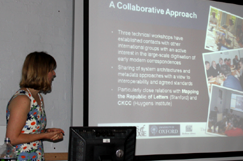
Kim introduces the catalogue.
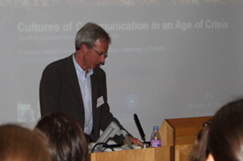
Howard's keynote on Hartlib.
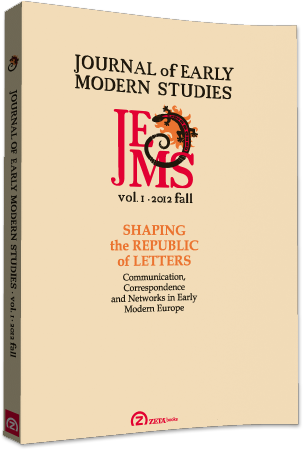 The new Journal of Early Modern Studies has launched with a special issue on Shaping the Republic of Letters: Communication, Correspondence, and Networks in Early Modern Europe.
The new Journal of Early Modern Studies has launched with a special issue on Shaping the Republic of Letters: Communication, Correspondence, and Networks in Early Modern Europe.
 The second annual Anglo-French Conference on Scientific Communication and its History will take place in Paris at the
The second annual Anglo-French Conference on Scientific Communication and its History will take place in Paris at the 





 Join
Join 